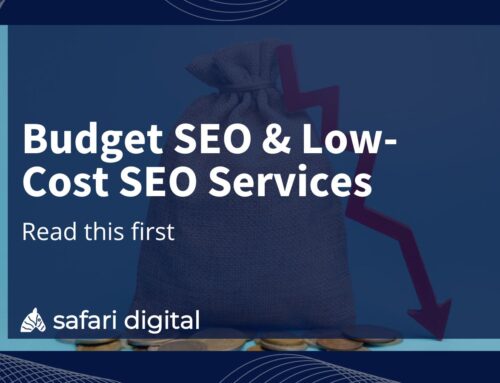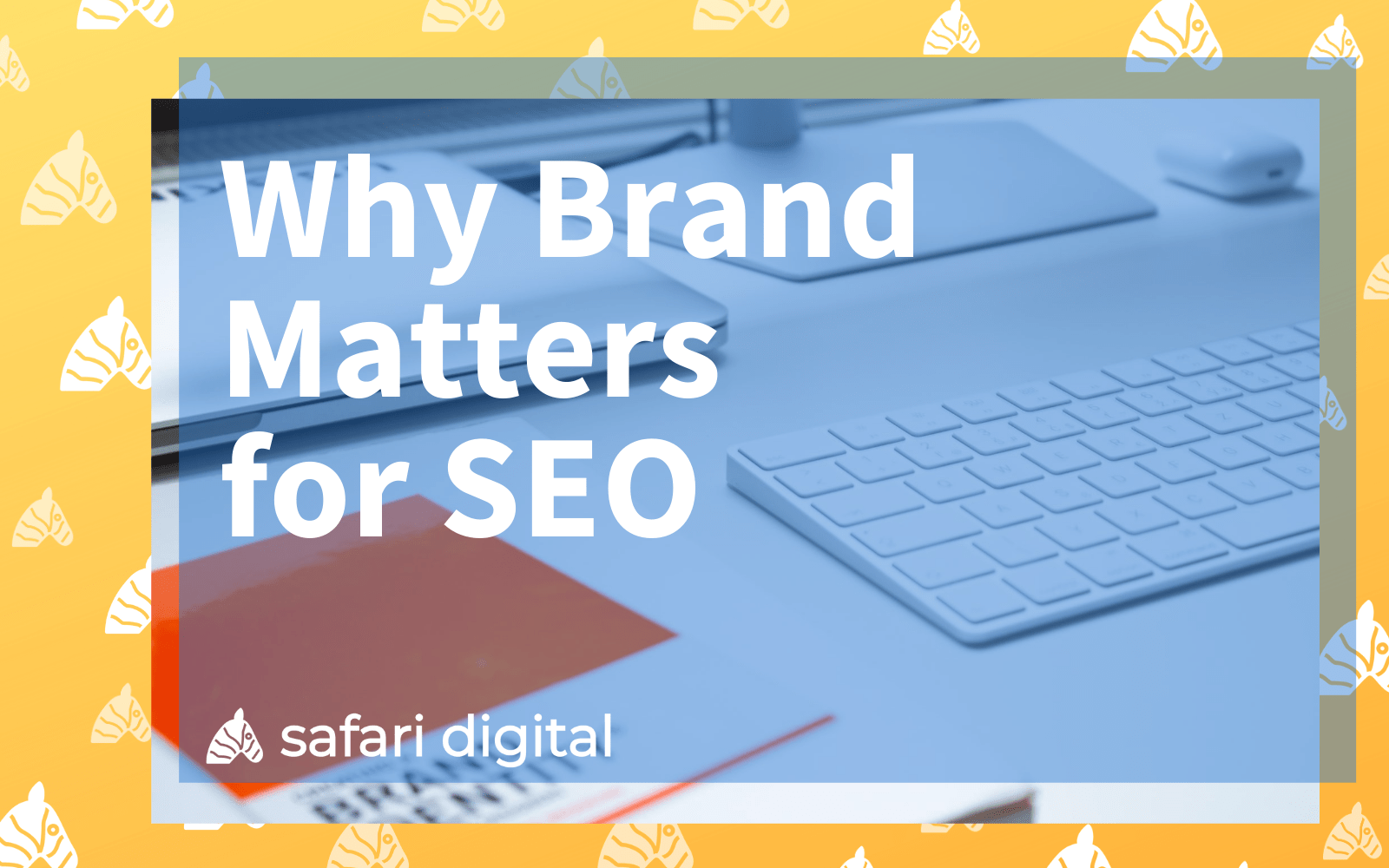
Brand SEO or SEO Branding is the most effective way to increase brand recognition and generate leads in one neat little package.
Business owners who are serious about harnessing the power of search engine optimisation for increase brand awareness must understand the power of brand recognition in the context of SEO.
SEO and brand building are two crucial elements of growing a business online and are actually somewhat dependent on each other. For instance, an enormous component of search engine optimisation will cultivate and require brand building. Furthermore, a business will struggle to increase brand awareness without the implementation of SEO. Like it or not, performance and recognition of brand matters for SEO.
Too often, SEOs and marketers get stuck within the idea that they need to separate branded performance from conversions and traffic acquired from non-branded organic search. The traditional line of thinking is that SEO and branding are two different sectors of building a business. We know that these two factors may overlap, but very few marketers are giving SEO branding the attention it deserves. Many get trapped within a keyword obsession and rather than focusing on what SEO means as a whole, they’re too busy racing towards rankings for desired non-branded keywords. A recent projected completed by our Sunshine Coast SEO team required ‘thinning’ keywords down to focus on ones that deepened branding efforts and ensured greater SERP coverage.
Don’t get me wrong – those coveted non-branded keyword rankings are undoubtedly important. But let’s not get lost in the idea that they are everything. At its core, SEO is about growing a business through organic search results. Inevitably, an enormous part of this growth process is intertwined in building and monitoring changes to branded organic traffic.
The reality is, brand interest enormously affects search engine optimisation performance, and it’s very difficult to increase brand awareness without the help of SEO.
Branding and SEO are Deeply Intertwined
In this article, we’ll provide a deep dive into the many ways branding and SEO are inextricably connected and how you can measure and implement SEO branding tips.
“What is SEO Branding?” you may ask. SEO branding refers to a process in which the brand of your business or company becomes an important source of organic traffic. Think about the brands that you know and love, and how they compare to smaller, lesser-known competitors within the same niche.
Brands that have user recognition and Google’s trust thrive in search engine result pages.
SEO branding works to help to build and promote a company’s recognition and trust with both search engines and users. Much like link building, SEO branding focuses on building relevance, authority and trust within search engine results.
Brand Recognition & SEO
Have you ever heard of brand name SEO? Brand name SEO refers to optimising a website and a company’s name to enhance brand image and increase brand awareness, with the aim of having consumers recognise a company’s name or product.
Recent search studies have revealed in a survey that 70% of users admit that they look for brands they know when choosing which result to click on from search. Moreover, users are more inclined to select search engine results ranked further down the page if they recognise the brand, rather than choosing a website that they’ve never heard of that’s ranked number one or two. Over the last few years, brand recognition has become critical to getting clicks.
Consider this: in your local supermarket are you going to go for the home brand version of cola soft drink? Or are you going to purchase the brand that you immediately recognise, i.e. Coca-Cola? I would say that most of us would go with a brand that we recognise and trust; for the most part, we’re creatures of habit.
The same could be applied to search engine results. Whatever the product may be, users are inevitably going to be more attracted to brands they recognise than brands they have never heard of before. Brand recognition is a crucial element of increasing a website’s trust, authority, click-through-rate, customer connection and ultimately, conversion rate.
Branded Searches & Conversions
Branded searches are all of the searches made that make use of your brand name, including variations of the brand’s title. A perfect example of a branded search is if someone were to search “Nike shoes”. This is a branded search – the user is searching specifically for a product from Nike, the athletics brand.
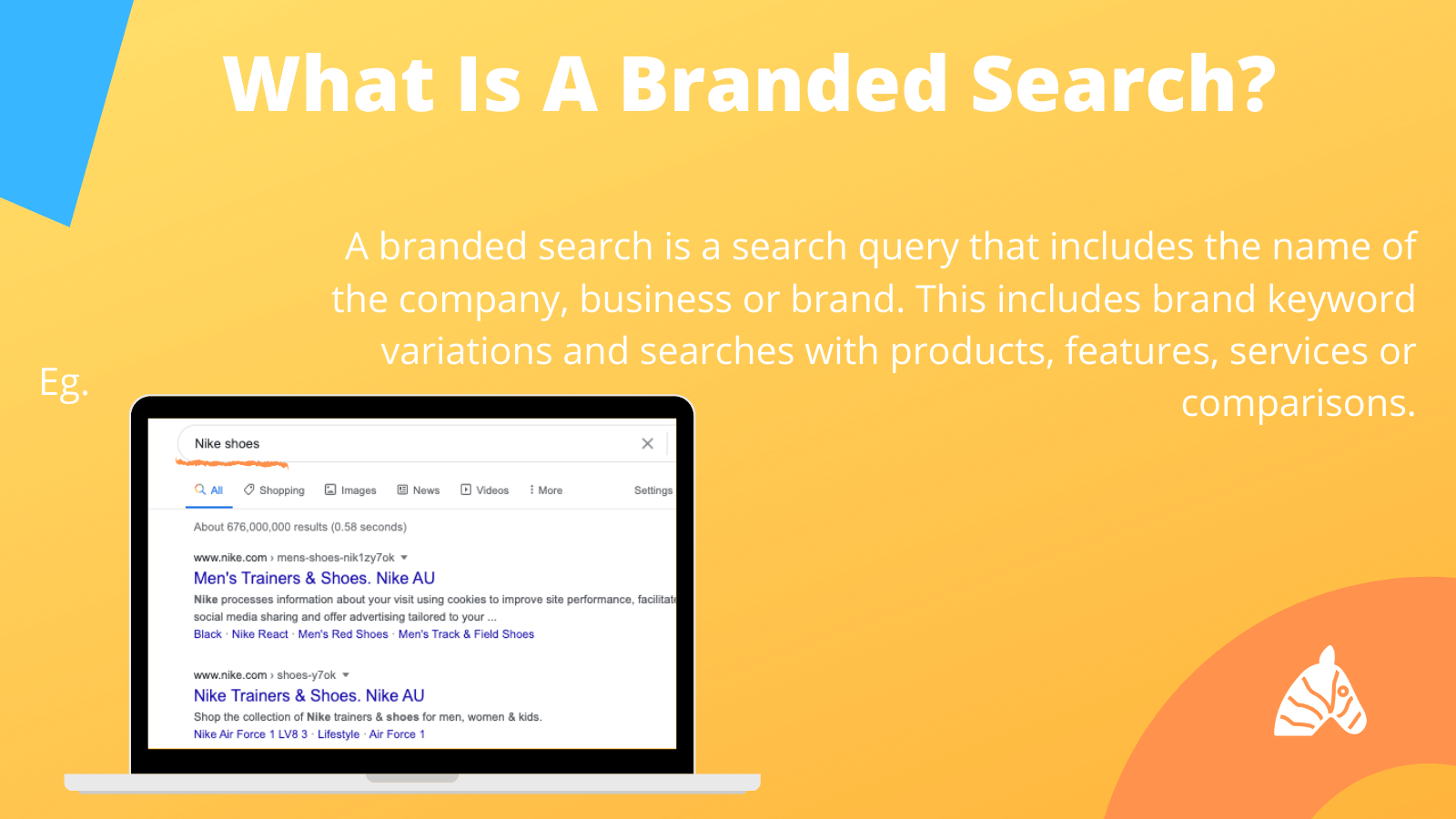
An increased number of branded searches can foster business growth in a number of ways. For starters, brand recognition is crucial for customer connection. If people are searching specifically for your brand or company, they obviously have seen or heard of you, and want to learn more. Once search engines begin to understand your brand recognition with users, this will only further lament your credibility and relevance within your industry.
Establishing this connection with customers is fundamental for brand performance and brand name SEO: once you have branded searches flowing in, you’ll benefit from branded conversions.
Branded conversions are particularly important. If someone is making a branded search, they are much more likely to convert. If they’re already searching for your brand specifically, it is likely that they are much further along the purchasing process than someone finding your products through a general search.
The most lucrative searches a user can make are high intent branded keywords. A high intent brand search is when a user specifically searches for your brand and one of your features, services or products. Rather than searching for “Nike”, or “shoes”, users searching for “Nike running shoes” are signifying that they know what they want, and they are more than ready to conduct a transaction with the specific brand.
Does Google Prioritise Brands in SERPs?
Over the years, it has long been speculated whether brand awareness is considered a ranking factor in SEO. A Google ranking factor is categorised by a specific algorithm input that the search engine uses to determine how websites display in search engine results.
Google has never come out and confirmed or denied whether a brand itself is a ranking factor. However, many signals that correlate closely with brands are probably used by Google, either directly or indirectly. In line with their efforts to provide reliable and informative experiences to users, it would make sense for Google to favour websites that offer a brand that can be trusted for consistent and reliable content.
So, how exactly does brand awareness correlate with Google rankings?
Backlinks
Links are a huge factor that undeniably impacts both brand building and authority in SERPs. Good, white-hat, sustainable earned backlinks will generally correlate with a company’s brand. And links are undeniably one of the most important, if not the single most important, ranking signals for Google. We’ll look closer on the correlation between link building and brand building in a moment.
Social Signals
Social signals refer to the collective shares, likes and overall visibility of a website’s social media presence. Social signals are another frequently speculated factor that may or may not be a direct ranking factor for Google’s algorithm. Many marketers will vehemently argue that social media content is frequently indexed and directly impacts search engine rankings. However, Google has denied that social signals are a ranking factor. Regardless of whether Google relies on the information directly, social signals correlate strongly with brand awareness and user interaction with a brand.
User Behaviour
Google aims to continuously provide an enhanced search experience for every user. Google can determine how effective and helpful a user’s experience is by analysing user and usage data online. Continuously measuring and relying on how users interact with search results, Google can identify user patterns and use this data to make informed decisions on rankings and visibility. This is where brand awareness can strongly correlate with Google rankings: if people are continuously interacting with a particular branded keyword, website or search result, Google will pick up on these patterns and make some ranking shifts.
Google might pick up on the fact that people are continuously searching for a particular brand’s product and use that information to determine rankings for either the product, the brand, or both. The same can be said for click-through-rate. We’re pretty confident that Google analyses CTR to determine which the order in which websites will present search results. If your brand is receiving a lot of clicks, this will increase your chances of outranking your competitors.
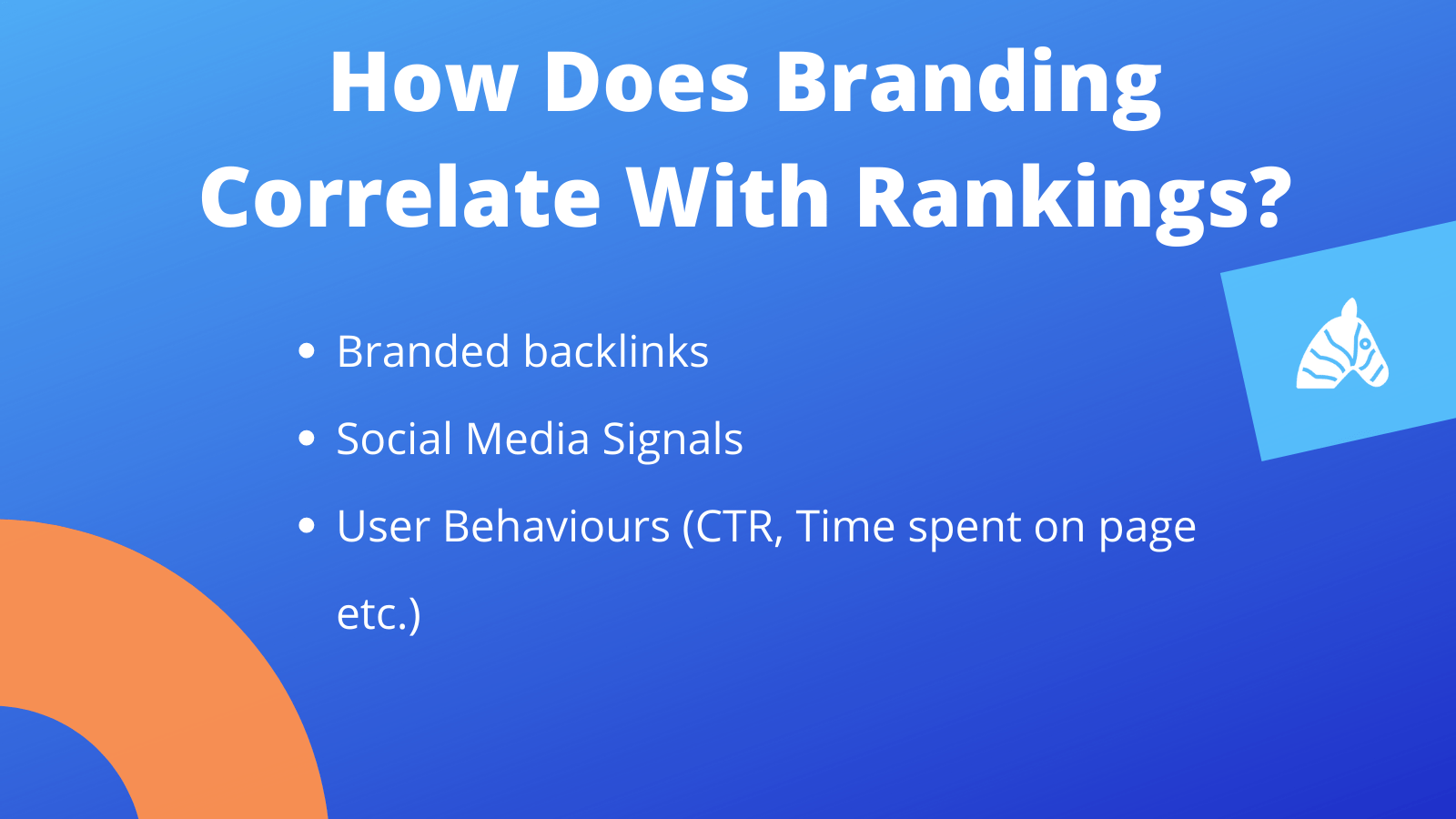
To play devil’s advocate, let’s say that Google is not yet giving preferential treatment to successful brands. In that case, brand awareness is still incredibly important for online recognition and credibility; which are huge factors for user’s decisions. And we all know how much Google wants to offer the best possible user experience. In other words, if users are showing interest in your brand, Google will show interest in your brand.
Link Building = Brand Building
Once you think about it, this connection becomes pretty obvious. Brand building focuses on increasing the recognition and acknowledgement of a brand. We can achieve this by improving the trust, authority, and relevance of a company with both users and search engines.
By building up your website’s trust, authority and validity with relevant links, you’re essentially proving to search engines that your brand is legitimate, credible, and relevant. A healthy backlink profile will naturally allude to a strong brand presence.
If you’re not familiar with sustainable link building practices, think of it as a way of earning validation from other sites without violating Google’s webmaster guidelines. Where link building used to be a matter of getting as many links as possible with keyword-rich anchor text, sustainable link-building focuses on getting other high-quality sites to endorse your website ethically. This means earning organic, editorial links that are relevant to the content and what your brand offers.
In 2023, the most ethical and sustainable links are those from relevant websites that use branded anchor text to link back to yours, to endorse your content, services, products or features. In simple terms, link building today strongly correlates with fostering a strong brand presence.
Measuring & Tracking Brand Activity
Getting a deep understanding of your brand performance and what percentage of your traffic is brand-relevant will help you to figure out what is working for your SEO branding and what isn’t. Despite what many think, there are ways to analyse brand performance and use the data to increase brand activity and awareness.
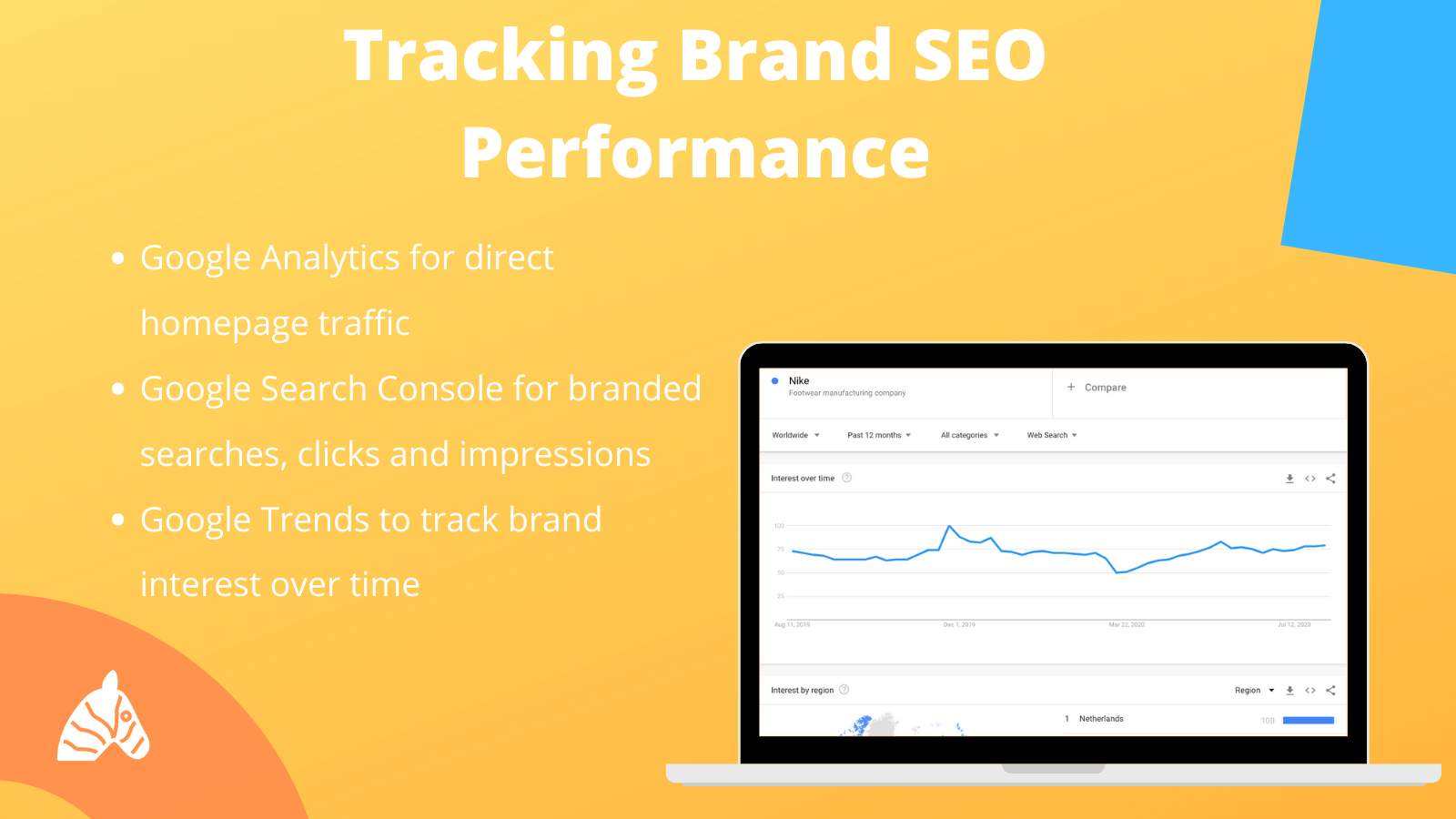
Direct Traffic to Homepage
Through Google Analytics, a website can easily track direct traffic to their homepage. Although this is not SEO-specific, it does give an insight into the people that are putting your site straight into the address bar and landing on your homepage, i.e. They definitely know and are interested in your brand.
Search Console Branded Searches
Google’s Search Console provides all data related to organic search. Search Console will provide you with the total brand impressions, searches and clicks, and will allow you to track these trends over time. You can run your brand name, including any variations, through console to find your branded queries that are already sending you traffic.
Google Trends
Note: Applicable to larger brands only.
Brands can use Google Trends to track their brand searches over time. Google Trends is a free platform that allows anyone to explore and track different search queries. By putting your brand name into Trends, you can also see when your brand searches peaked in interest to understand how you have performed over time.
Third-Party Analysers
There are also many third-party tools that will track and measure brand performance. Various tools will provide data on brand interest, trends, keyword variations, searches and clicks coming through.
Wrapping Up
Gone are the days of the early internet where an SEO expert could just flood landing pages with the brand’s name to increase brand awareness SEO.
Today, you need to consider a comprehensive campaign to increase brand reach, improve brand image, and enhance brand awareness.
Our top SEO branding tips? Stop thinking about brand performance as a separate element of online marketing and start utilising your brand interest. SEO and branding are two factors of building a business that rely on each other to support and foster growth strategies.
For many SEOs, this means incorporating brand performance as a consideration for your regular optimisation strategies. As well as optimising your keywords, title tags, H1 tags and content, think about the influence of the brand in all aspects of SEO.
Some basic SEO branding tips include chasing those brand mention links, diving deeper on branded search data, and using the collected data to increase the interest and popularity of a brand in search.
While we’re still speculating on whether brands are a direct Google ranking factor, we do understand that there is a link between brands, user interactions, and search engine rankings.
SEO branding will help to build trust with your target audience, understand the mindset of your target consumer, and plant a seed of recognition that could spawn into a powerful, long-term lead generator.
The key takeaway from this article that as an SEO, branding is a huge asset. Brand performance is incredibly important, and an enormous part of how you optimise a website for search. If you want your business or one of your client’s business to continue growing online, you need to take a holistic approach to search engine optimisation where the company’s brand interest is not only a huge factor; but an enormously beneficial asset.



